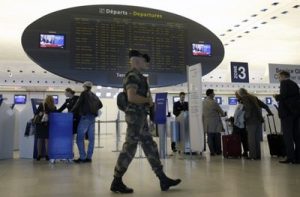A travel alert issued on October 3 warned Americans to remain vigilant while traveling to Europe because of possible terror threats. The U.S. State Department’s official

warning said, “Current information suggests that Al Qaeda and affiliated organizations continue to plan terrorist attacks. European governments have taken action to guard against a terrorist attack and some have spoken publicly about the heightened threat conditions.”
British authorities told its citizens to be on alert while traveling in France and Germany, changing the terror threat from “general” to “high.” The French Ministry of Foreign Affairs already set the possibility of a terror threat to “high,” and that will remain unchanged. However, French officials say they are taking the U.S. warning seriously. On October 5, the French police arrested 12 people in two anti-terrorism raids.
The planned attacks are supposedly similar to the 2008 Mumbai massacre that left more than 160 people dead. Ten men targeted a famous train station as well as tourist hot spots for shooting and bombing attacks.
Bearing the Mumbai massacre in mind, Americans have been warned to remain alert in and around the areas of public transportation systems and tourist infrastructures. Last month, French officials had the Eiffel Tower evacuated twice because of concerns that the landmark is on Osama bin Laden’s “hit list.”
U.S. officials emphasized that the alert does not tell Americans to cancel their travel plans, but simply tells them to be cautious. “If they see unattended packages or hear loud noises or see something beginning to happen that they should quickly move away from them,” Undersecretary of State Patrick Kennedy told reporters. The State Department also suggests registering travel plans with the U.S. Embassy.
Many are saying that the best defense is a well-informed citizen. For example, in May, a vendor in Times Square reported seeing a car smoking, and Faisal Shahzad’s plan to bomb the famous New York City intersection failed. In short, if you see something, say something. The alert will remain in effect until January 31, 2011.







